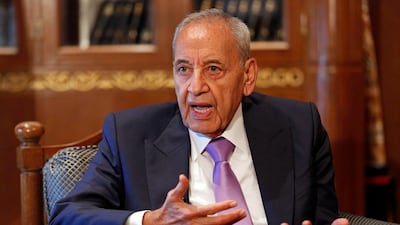Lebanon's longtime parliament speaker Nabih Berri often seems like a veteran schoolteacher with a class of unruly students, using threats and jokes and occasional gavel-pounding to keep the assembly in order.
The 80-year-old has held the job for a quarter-century, and is set to be re-elected as speaker for a sixth time on Wednesday, when the new assembly convenes after national elections earlier this month — the first in nine years.
That he faces no challengers, and rarely has over the years, owes much to Lebanon's sectarian-based and elite-dominated political system, which has mostly kept the peace since the 1975-1990 civil war, but has also spawned political paralysis and endemic corruption.
Mr Berri is seen by some as an embodiment of that system, which shows no signs of changing despite rising discontent. But the parliament speaker, who is one of Lebanon's most influential and enduring politicians, is also seen as a moderate, unifying figure who lifted his Shiite community's profile and role in the country's postwar politics, often acting as mediator among feuding Lebanese factions.
"I don't believe that there is anyone else who has the characteristics, shrewdness and skills to be parliament speaker more than he does," said Fouad Siniora, a former prime minister from a rival bloc who had tense relations with Mr Berri during his term.
___________
Read more
US-Gulf sanctions target top leaders of Hezbollah
Michael Young: Hezbollah's rise is price Lebanon paid for handing control Syria after civil war
Drugs, diamonds and used cars: the Hezbollah network the US destroyed
___________
Lebanon's political system, built to distribute power among its various sects, mandates a Christian president, a Sunni Muslim prime minister and a Shiite parliament speaker, while the Cabinet and parliament seats are equally divided between Muslims and Christians. As leader of the Shiite Amal movement, which is closely allied with the Shiite militant group Hezbollah, Mr Berri is virtually untouchable. The two parties hold all but one of the 27 seats allotted to Shiites in parliament.
"This is the reality in Lebanon," said Nabil Bou Monsef, deputy editor-in-chief of the leading daily An-Nahar. "As long as he is the man chosen by his sect to head the parliament, no other sect will veto him as this will lead to sectarian conflict...These are the rules of the game".
Mr Berri was elected leader of the Amal movement in 1980 after al-Sadr disappeared while visiting Libya two years earlier. He forged close ties with Syrian President Hafez Al Assad and remains closely allied to Al Assad's son and successor, Bashar.
In the years after the civil war, Mr Berri emerged as a canny mediator who maintained friendly ties with the country's various factions and worked to prevent them from relapsing into civil war.
But he is also seen as part of a narrow political elite that has been unable to provide basic services.
Critics also accuse Mr Berri of holding up the legislative process when it suits his needs, and his supporters have taken to the streets in violent protests when other factions have challenged him. Earlier this year they blocked Beirut streets with burning tyres and trash bins after a leaked video showed the foreign minister calling Mr Berri a "thug" in a closed meeting.
Mr Berri, who has nine children and 26 grandchildren, insists he won't follow the local tradition of keeping his job in the family, but the octogenarian also has no plans to step down.
"There is no retirement in politics," he said. "As long as you serve your people and you can work, you will work".

